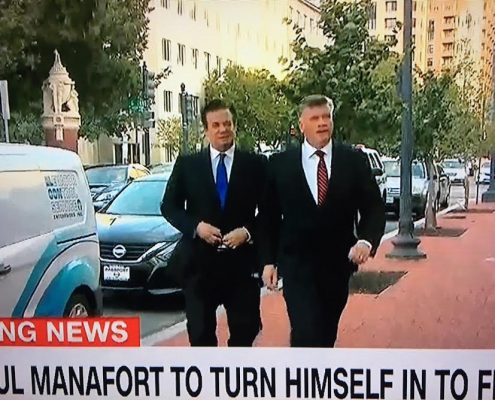The Tea Leaves on Mueller’s Hand Off
As part of writing this post, I confirmed for the first time that the prosecutor I spoke with regarding the Russian attack is not and never has been part of the Mueller team (among other things, I think that means Peter Strzok never got within a mile of my testimony, which is why I asked). But a prosecutor who was involved in discussions setting up my interview is, and the Special Counsel’s Office certainly seemed to recognize my interview as part of the investigation when I alerted them I was going to publish that text. Given that the FBI agents I spoke with didn’t know what topics I cover for a living (and seemed to get wiser about the person we were discussing over two breaks), my guess is that DOJ assigned a team segmented off from the investigation to ensure that no one accidentally dropped hints about the investigation. That’s all just a wildarseguess, though. DOJ has gone to great lengths to ensure I don’t learn anything from the process, as is proper.
Having that tiny glimpse into how DOJ used a prosecutor uninvolved in the case in chief to talk to me about what may have become part of the case in chief is background to explain why I doubt some of the conclusions made in this piece, reporting that Mueller has divvied up tasks to career prosecutors from elsewhere in DOJ.
As Mueller pursues his probe, he’s making more use of career prosecutors from the offices of U.S. attorneys and from Justice Department headquarters, as well as FBI agents — a sign that he may be laying the groundwork to hand off parts of his investigation eventually, several current and former U.S. officials said.
Mueller and his team of 17 federal prosecutors are coping with a higher-then-expected volume of court challenges that has added complexity in recent months, but there’s no political appetite at this time to increase the size of his staff, the officials said.
[snip]
Investigators in New York; Alexandria, Virginia; Pittsburgh and elsewhere have been tapped to supplement the work of Mueller’s team, the officials said. Mueller has already handed off one major investigation — into Trump’s personal lawyer, Michael Cohen — to the Southern District of New York.
The only thing that is clearly new in this paragraph is that Mueller has involved prosecutors in Pittsburgh. As the paragraph itself notes, [part of] the investigation into Michael Cohen got handed off to SDNY. But that’s because it involves conduct — a hush money payment that Cohen arranged from Manhattan and taxi medallion fraud — that don’t clearly relate to Russian election interference. Other reports suggest that conduct more closely tied to the election, such as Cohen’s involvement in inauguration graft, remains in Mueller’s hands.
Similarly, we know of at least one EDVA prosecutor involved in Mueller’s investigation. Uzo Asonye got moved onto the team to placate TS Ellis. He will presumably present a good part of the trial that starts later this month, freeing up another member of that team to focus on the DC side of Manafort’s corruption. But that move was driven, in significant part, from Ellis’ direction.
With Michael Cohen and Paul Manafort, there’s plenty of corruption to spread across multiple districts! Heck, Manafort’s former son-in-law is cooperating against him based off a case in LA, and Dmitri Firtash, who is under indictment in Chicago, is one of four oligarchs explicitly named in Manafort’s search warrant.
And, frankly, I’m offended by this passage.
Mueller indicted 13 Russian individuals and three entities in February on charges of violating criminal laws with the intent to interfere with the U.S. election through the manipulation of social media.
None of the targets are in the U.S., but one of them, the Internet Research Agency, has forced Mueller into another legal fight in federal court. The two sides have been sparring most recently over how to protect sensitive investigative materials from disclosure. Mueller has enlisted prosecutors with the U.S. Attorney’s office in Washington to handle the case.
I’m offended not just because the passage is factually false: the entity mounting a defense is Concord Management, not Internet Research Agency. But because one should never label a defendant mounting a defense as “forc[ing the prosecutor] into another legal fight.” Yes, Concord’s defense is trollish lawfare aiming to discover intelligence. But that is the risk of using indictments to lay out nation-state information operations.
Also, as I suggested in this post and this post, commentators have made far too much of the technical requirements of the Concord case. The government will use no classified data in the trial, if the trial ever really happens. Which suggests the case will be a glorified call records case, showing that the people running certain accounts were operating from certain IP addresses. That’s not to minimize the import of call records in proving crimes. But it’s just not the most technically difficult case to prove.
Which brings us back to Pittsburgh. In fact, Pittsburgh has already been involved in this case — back when the investigation of the hack of the DNC lived there, as many nation-state hacking cases do. Now, it is definitely true that the hack investigation had, at some point, been moved under Mueller; I know of a witness to the hack who was interviewed at Mueller’s office. But if Mueller’s team of 17 were focused more closely on the “collusion” case, I could imagine them moving the hack case back to where it started.
If that’s actually what happened, it would amount to a hand off, of sorts. But it may not be all that momentous a development. Rather, it might reflect Mueller’s (and Rod Rosenstein’s) continued efforts to keep the matters he will prosecute (as distinct from investigate) closely related to the “collusion” case. That seems like a sound decision both form a resourcing perspective, but it’s a good way to rebut claims that he’s a runaway prosecutor.



